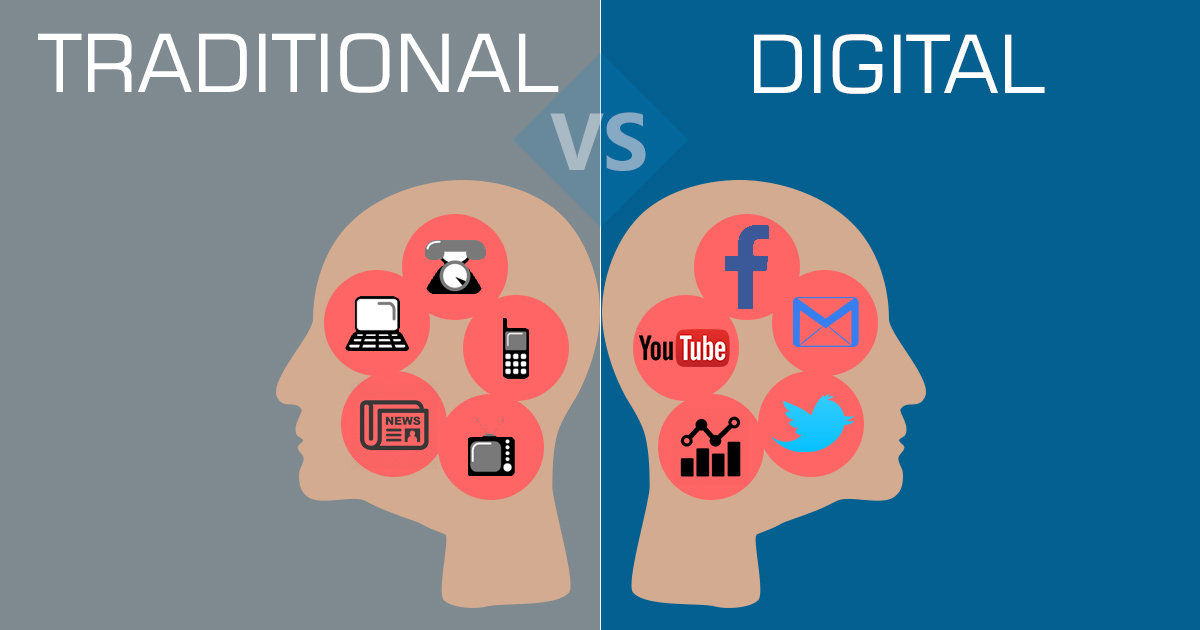Businesses in this fast-paced digital age need to change in order to remain competitive. One of the biggest changes in recent years has been the shift from traditional marketing to online marketing. Traditional marketing techniques, such as print ads, billboards, and TV commercials, are gradually being replaced by digital strategies that are more precise, effective, and affordable. In this article, we will discuss the many advantages of online marketing over traditional marketing and the reasons why this shift is essential for contemporary businesses.

Reasons to switch from Traditionl Marketing to Online Marketing
Expanded Scope and Worldwide Readership:
Geographical restrictions frequently impose limitations on traditional marketing. Only a specified amount of individuals in a given area can see an advertisement in the local newspaper or on a billboard. Conversely, these obstacles are removed by online marketing. Businesses can reach a worldwide audience by implementing digital marketing methods. Online marketing gives small and large businesses alike the ability to connect with potential clients anywhere in the world.
Cost-Effectiveness:
Online marketing strategies like social media advertising, email campaigns, and search engine optimization (SEO) are often far more affordable than traditional marketing methods. Additionally, because online marketing campaigns can be scaled according to the budget, they are accessible to businesses of all sizes. When compared to traditional marketing methods, online marketing is significantly more cost-effective.
Targeted Advertising:
Digital marketing platforms such as Google Ads and Facebook Ads allow businesses to target specific demographics, interests, and behaviors. This precision ensures that your marketing efforts reach the right people at the right time, increasing the likelihood of conversions. Traditional marketing is often a shot in the dark, hoping to reach a broad audience with a generalized message. Online marketing, however, allows for highly targeted advertising.
Enhanced Engagement and Interaction:
Traditional marketing is frequently a one-way communication channel, where corporations broadcast messages to a passive audience. On the other hand, online marketing encourages reciprocal engagement and communication. Businesses can engage directly with customers through social media platforms, blogs, and email newsletters, providing them with answers to their questions and fostering relationships. Higher levels of client satisfaction and loyalty are the result of this enhanced involvement.
Measurable Analytics and Outcomes:
Campaign efficacy might be difficult to gauge with traditional marketing. How can you tell whether more sales resulted from your billboard? Measurable outcomes and in-depth data are offered by internet marketing. Real-time data on campaign performance is available through tools like email marketing software, social media insights, and Google Analytics. Businesses can monitor important metrics like website traffic, conversion rates, and return on investment (ROI) using this data-driven strategy, facilitating ongoing optimization and development.
Adaptability and Flexibility:
There is no greater flexibility and adaptability than with online marketing. With a few clicks, digital campaigns can be started, changed, or stopped. Businesses are able to react swiftly to consumer input, market changes, and rivalry thanks to their agility. On the other hand, traditional marketing programs can have longer lead times and are more difficult to modify once they are underway.
Increased Rates of Conversion:
When compared to traditional marketing tactics, online marketing’s accuracy, engagement, and personalization frequently result in greater conversion rates. Businesses can more successfully steer potential clients through the sales funnel by focusing on the correct audience and sending them pertinent communications. Retargeting advertisements and email marketing are two examples of online marketing strategies that nurture leads and motivate them to take action, which increases revenue and sales.
Personalization and Customization:
A great deal of customisation and personalization are made possible by online marketing.. With data on customer preferences and behaviors, businesses can create personalized marketing messages that resonate with individual customers. Personalized emails, product recommendations, and targeted ads enhance the customer experience and increase the likelihood of conversions. This degree of personalization is absent from traditional marketing, which frequently sends generic messages to a large audience.
Improved Customer Insights:
By using analytics tools, businesses can collect data on website visits, content engagement, and social media interactions. This data gives them a better understanding of their target audience and allows them to customize their marketing strategies, products, and services. Traditional marketing does not offer this kind of insight, which makes it more difficult to identify and satisfy customer needs.
Environmentally Friendly:
Lastly, online marketing is more environmentally friendly than traditional marketing. Print ads, brochures, and direct mail leads to wastage of paper and environmental degradation. Online marketing reduces the need for physical materials, aligning with the growing consumer preference for sustainable business practices. Businesses may attract eco-aware clients and reduce their environmental impact by implementing digital marketing techniques.
Conclusion:
There are many advantages for businesses trying to maintain their competitiveness in the digital era when they switch from traditional to online marketing. Online marketing offers effective ways to engage with clients and propel business success, from expanded reach and cost-effectiveness to targeted advertising and quantifiable outcomes. By implementing online marketing methods, organizations may gain greater flexibility, engagement, and success in today’s ever-evolving industry.
The moment has come to transition to internet marketing if your company is still largely dependent on conventional marketing strategies. Accept the future, make the most of digital tactics, and observe how your company pro
